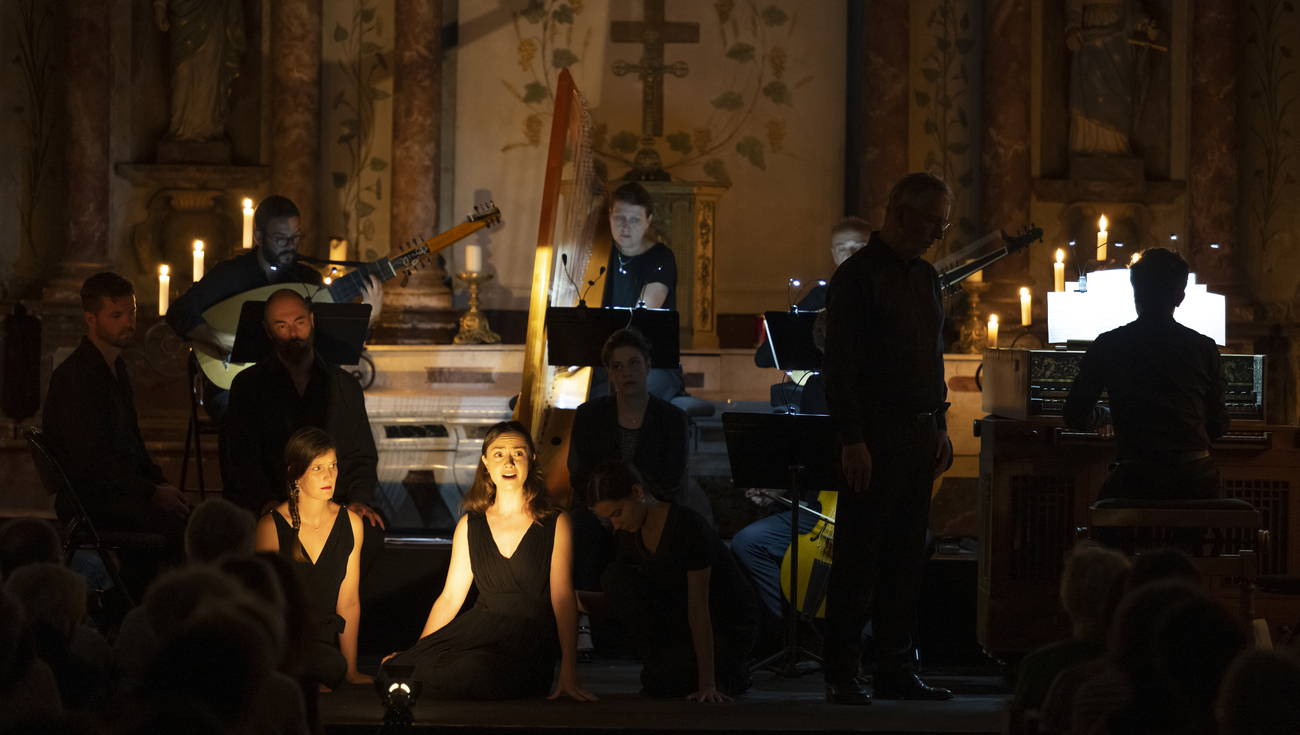Jephthah
Ensemble
Ensemble Les Arts Florissants
Musical Direction and tenor
Cast
Lauren LODGE CAMPBELL, soprano
Natasha SCHNUR, soprano
Clémence VIDAL, mezzo-soprano
Mathilde ORTSCHEIDT, contralto
Edward GRINT, bass
Program
Giacomo CARISSIMI - Jephte
"A lament that one would wish would never end, and where Lauren Lodge Campbell's moving soprano (Jardin des Voix 2019) isolated in a beam of light stands out from a vocal ensemble that one departs with regret." Res Musica
Paul Agnew and Les Arts Florissants offer a new reading of Jephte, in this concert program featuring Giacomo Carissimi's oratorio alongside works by his contemporaries Monteverdi and Rossi...
From oratories to oratorios
Among the most important acts of the Counter-Reformation, St. Philip de Neri (1515-1595) obtained from Gregory XIII the institution of the Congregazione dell’Oratorio. In its oratories, new buildings attached to various churches, the laymen could devote themselves to spiritual exercises, consisting of readings and songs. Concerts and edifying performances could also be offered. As early as the 1620s, compositions alternating dialogues in recitative style and madrigal choirs were performed every Friday in Lent and throughout the Holy Week in the oratories: these Dialoghi and Historiae sacrae were soon to be called "oratorios".
Giacomo Carissimi (1605-1674) produced seventeen of these "sacred histories", including the first masterpieces of the genre, Jephthah, Baltazar and Jonah. The initial training of this musician from Lazio remains shrouded in mystery. He was first found in Tivoli in 1623, where he was cantor and then organist in the Duomo chapel. In 1628 and 1629, he held the position of choirmaster of the church of San Ruffino in Assisi. In 1630 he moved to Rome, where he was appointed choirmaster of the church of Sant’Apollinario, a branch of the Collegium Germanicum et Hungaricum, one of the main Jesuit institutions in the city. He became a renowned teacher. Many leading composers claimed to be his disciples: Johann Caspar von Kerll, Christoph Bernhard and Johann-Philipp Krieger were students of the Collegium Germanicum, and perhaps also (but the fact remains debated) Marc-Antoine Charpentier. Carissimi’s fame was most enduring: in 1715, Bourdelot still called him "the greatest musician that Italy has produced”.
The sacrifice of Jephthah
Jephthah, whose premiere date is not known, is without question the most famous of Carissimi’s compositions. It is above all the most revealing of his style, combining apparent simplicity, intense expressiveness and dramatic efficiency. This «sacred story,» at once concise, edifying, and moving, adopts a construction very different from later oratorios. The musical and poetic discourse is organized in several episodes, consisting of a succession of narratives, entrusted to soloists or to small ensembles, punctuated by choral interventions. These are most often elaborated in six voices, in the manner of a vast double choir, where the three soprano voices would be opposed to the three lower voices (alto, tenor and bass).
The story is organized in four scenes: Jephthah’s vow and the battle against the Ammonites (a scene of spectacular music), the canticle of rejoicing of the Filia and her followers (the only appearance of a festive aria in this work dominated by the recitative style), the eminently dramatic dialogue of Jephthah and his daughter (a much dramatic scene), and the great final lamentation (the Filia’s lament of resignation to her death, haloed by plaintive echoes in two sopranos, followed by its amplification by the sublime concluding chorus). Carissimi exploits here all the resources of Baroque musical rhetoric, using characteristic figures with obvious expressive connotations. The final chorus ("Plorate"), in which the children of Israel are called upon to mourn the sacrifice of the young girl, is the best example, with its haunting repetitions of descending melodic figures, its painful chromaticism, and its harmony filled with sweet and poignant dissonances.
(Text by Denis Morrier, reproduced with the kind autorisation of the Cité de la Musique - Philharmonie de Paris)
Previous dates
New York / United States
Morgan Library
- Tuesday, February 13 2024, 7.30pm









